初中英语知识点微课课件 考点精讲 22 一般现在时(15张PPT)
文档属性
| 名称 | 初中英语知识点微课课件 考点精讲 22 一般现在时(15张PPT) |  | |
| 格式 | pptx | ||
| 文件大小 | 1.7MB | ||
| 资源类型 | 试卷 | ||
| 版本资源 | 通用版 | ||
| 科目 | 英语 | ||
| 更新时间 | 2021-07-14 10:59:18 | ||
图片预览


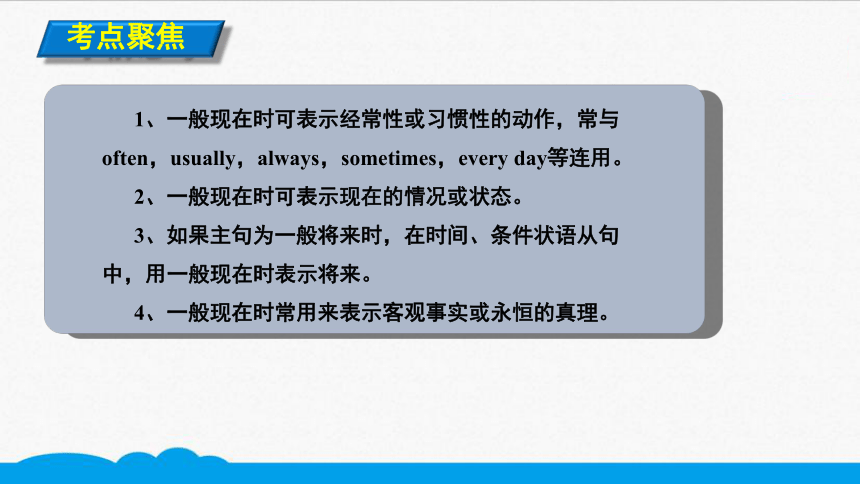
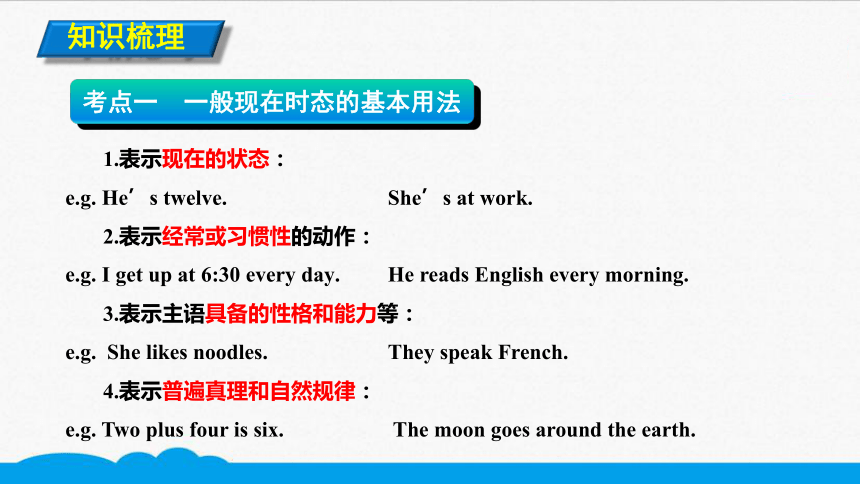
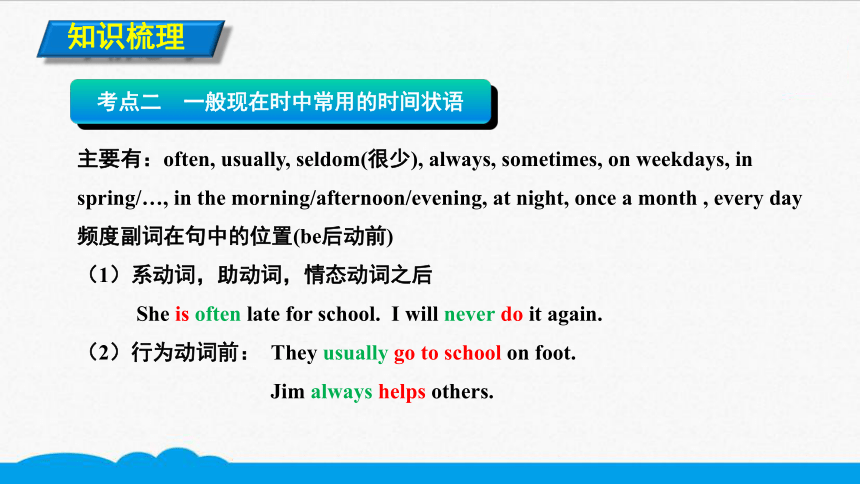
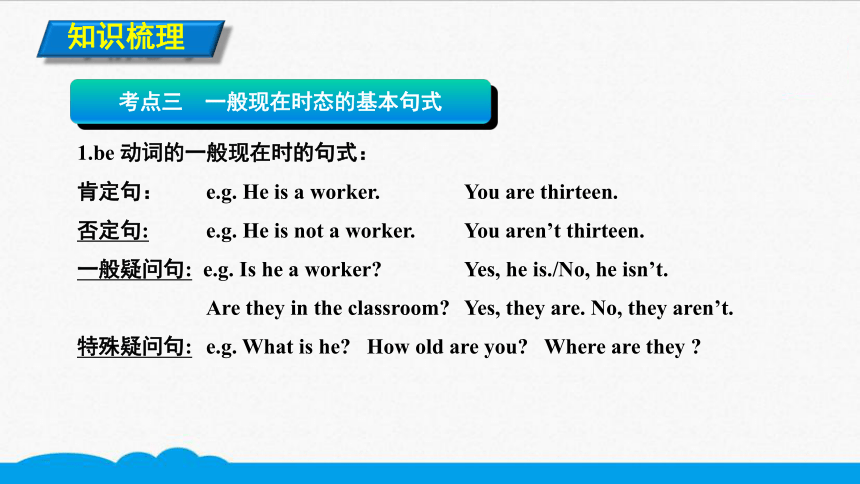
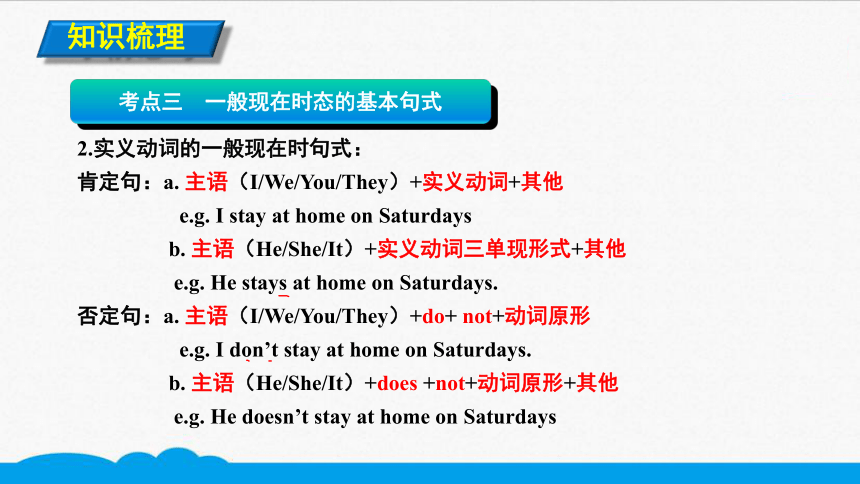
文档简介
一般现在时
激趣导入
考点聚焦
1、一般现在时可表示经常性或习惯性的动作,常与often,usually,always,sometimes,every day等连用。
2、一般现在时可表示现在的情况或状态。
3、如果主句为一般将来时,在时间、条件状语从句中,用一般现在时表示将来。
4、一般现在时常用来表示客观事实或永恒的真理。
考点一 一般现在时态的基本用法
知识梳理
1.表示现在的状态:
e.g. He’s twelve. She’s at work.
2.表示经常或习惯性的动作:
e.g. I get up at 6:30 every day. He reads English every morning.
3.表示主语具备的性格和能力等:
e.g. She likes noodles. They speak French.
4.表示普遍真理和自然规律:
e.g. Two plus four is six. The moon goes around the earth.
知识梳理
考点二 一般现在时中常用的时间状语
主要有:often, usually, seldom(很少), always, sometimes, on weekdays, in spring/…, in the morning/afternoon/evening, at night, once a month , every day
频度副词在句中的位置(be后动前)
(1)系动词,助动词,情态动词之后
She is often late for school. I will never do it again.
(2)行为动词前: They usually go to school on foot.
Jim always helps others.
知识梳理
考点三 一般现在时态的基本句式
1.be 动词的一般现在时的句式:
肯定句: e.g. He is a worker. You are thirteen.
否定句: e.g. He is not a worker. You aren’t thirteen.
一般疑问句: e.g. Is he a worker? Yes, he is./No, he isn’t.
Are they in the classroom? Yes, they are. No, they aren’t.
特殊疑问句: e.g. What is he? How old are you? Where are they ?
知识梳理
考点三 一般现在时态的基本句式
2.实义动词的一般现在时句式:
肯定句:a. 主语(I/We/You/They)+实义动词+其他
e.g. I stay at home on Saturdays
b. 主语(He/She/It)+实义动词三单现形式+其他
e.g. He stays at home on Saturdays.
否定句:a. 主语(I/We/You/They)+do+ not+动词原形
e.g. I don’t stay at home on Saturdays.
b. 主语(He/She/It)+does +not+动词原形+其他
e.g. He doesn’t stay at home on Saturdays
知识梳理
考点三 一般现在时态的基本句式
2.实义动词的一般现在时句式:
一般疑问句:
a. Do+主语(I/we/you/they)+动词原形+其他?
e.g. Do you stay at home on Saturdays?
b. Does+主语(he/she/it)+动词原形+其他?
e.g. Does he stay at home on Saturdays?
特殊疑问句:疑问词+ do/does+主语+动词原形+其他?
e.g. What time do you have lunch?
缩写形式: doesn’t = does not; don’t = do not
3.实义动词第三人称单数的动词形式变化规则:
绝大多数动词
+s
walk—walks
辅音字母+y结尾的动词
将y改为i+es
fly—flies
以s, x, ch, sh 结尾的动词
+es
watch—watches
一些以o结尾的动词
+es
go—goes
do—does
have的第三人称单数为has
知识梳理
考点三 一般现在时态的基本句式
典例剖析
练习:根据要求进行句型转换
1.This is my pencil ? (变一般疑问句)
??____ _____ _______ pencil ?
2. These red socks are Kate’s . (变一般疑问句)
??_____ _____ socks Kate’s ?
3. I want to buy a big green bag . (划线部分提问)
______ ______ you want to buy ?
4. Mary does not have any books . (变肯定句)
Mary ____ ______books .
has some
What do
Is this your
Are these
典例剖析
练习:根据要求进行句型转换
5. The teacher wants to join a music club . (特殊疑问句)
_____ club ______ the teacher want to join ?
6. She doesn’t know when to join the rock band . (肯定句)
She ______? when to join the rock band .
7. My mother usually has lunch at 12:12 . (画线提问)
?? ?_____ ____ ____ your mother usually _____ lunch ?
8. Lily goes home late on Friday afternoon . (一般疑问句)
??? ______ Lily ___ home late on Friday afternoon ?
What does
knows
What time does have
Does go
中考链接
1. I will tell him as soon as he _____ back
A. come B. comes C. will come D. came
2. Neither I nor he ______ French.
A. speak B. doesn’t speak
C. speaks D. doesn’t speak
3. Nobody ______ how to run this machines.
A . knows B. have known C. know D. is knowing
4. I hope he will come to see me before he ____ here .
A. leave B. leaves C. will leave D, left
备考技法
一般现在时在不同句型中的用法:注意陈述句,疑问句和否定句的变化。掌握第三人称单数的变化形式。
在条件状语从句、时间状语从句中,主将从现。
在宾语从句中,从句内容若为客观事实或真理,从句时态不受主句约束,为一般现在时。
思维导图
元申小课 必有收获
激趣导入
考点聚焦
1、一般现在时可表示经常性或习惯性的动作,常与often,usually,always,sometimes,every day等连用。
2、一般现在时可表示现在的情况或状态。
3、如果主句为一般将来时,在时间、条件状语从句中,用一般现在时表示将来。
4、一般现在时常用来表示客观事实或永恒的真理。
考点一 一般现在时态的基本用法
知识梳理
1.表示现在的状态:
e.g. He’s twelve. She’s at work.
2.表示经常或习惯性的动作:
e.g. I get up at 6:30 every day. He reads English every morning.
3.表示主语具备的性格和能力等:
e.g. She likes noodles. They speak French.
4.表示普遍真理和自然规律:
e.g. Two plus four is six. The moon goes around the earth.
知识梳理
考点二 一般现在时中常用的时间状语
主要有:often, usually, seldom(很少), always, sometimes, on weekdays, in spring/…, in the morning/afternoon/evening, at night, once a month , every day
频度副词在句中的位置(be后动前)
(1)系动词,助动词,情态动词之后
She is often late for school. I will never do it again.
(2)行为动词前: They usually go to school on foot.
Jim always helps others.
知识梳理
考点三 一般现在时态的基本句式
1.be 动词的一般现在时的句式:
肯定句: e.g. He is a worker. You are thirteen.
否定句: e.g. He is not a worker. You aren’t thirteen.
一般疑问句: e.g. Is he a worker? Yes, he is./No, he isn’t.
Are they in the classroom? Yes, they are. No, they aren’t.
特殊疑问句: e.g. What is he? How old are you? Where are they ?
知识梳理
考点三 一般现在时态的基本句式
2.实义动词的一般现在时句式:
肯定句:a. 主语(I/We/You/They)+实义动词+其他
e.g. I stay at home on Saturdays
b. 主语(He/She/It)+实义动词三单现形式+其他
e.g. He stays at home on Saturdays.
否定句:a. 主语(I/We/You/They)+do+ not+动词原形
e.g. I don’t stay at home on Saturdays.
b. 主语(He/She/It)+does +not+动词原形+其他
e.g. He doesn’t stay at home on Saturdays
知识梳理
考点三 一般现在时态的基本句式
2.实义动词的一般现在时句式:
一般疑问句:
a. Do+主语(I/we/you/they)+动词原形+其他?
e.g. Do you stay at home on Saturdays?
b. Does+主语(he/she/it)+动词原形+其他?
e.g. Does he stay at home on Saturdays?
特殊疑问句:疑问词+ do/does+主语+动词原形+其他?
e.g. What time do you have lunch?
缩写形式: doesn’t = does not; don’t = do not
3.实义动词第三人称单数的动词形式变化规则:
绝大多数动词
+s
walk—walks
辅音字母+y结尾的动词
将y改为i+es
fly—flies
以s, x, ch, sh 结尾的动词
+es
watch—watches
一些以o结尾的动词
+es
go—goes
do—does
have的第三人称单数为has
知识梳理
考点三 一般现在时态的基本句式
典例剖析
练习:根据要求进行句型转换
1.This is my pencil ? (变一般疑问句)
??____ _____ _______ pencil ?
2. These red socks are Kate’s . (变一般疑问句)
??_____ _____ socks Kate’s ?
3. I want to buy a big green bag . (划线部分提问)
______ ______ you want to buy ?
4. Mary does not have any books . (变肯定句)
Mary ____ ______books .
has some
What do
Is this your
Are these
典例剖析
练习:根据要求进行句型转换
5. The teacher wants to join a music club . (特殊疑问句)
_____ club ______ the teacher want to join ?
6. She doesn’t know when to join the rock band . (肯定句)
She ______? when to join the rock band .
7. My mother usually has lunch at 12:12 . (画线提问)
?? ?_____ ____ ____ your mother usually _____ lunch ?
8. Lily goes home late on Friday afternoon . (一般疑问句)
??? ______ Lily ___ home late on Friday afternoon ?
What does
knows
What time does have
Does go
中考链接
1. I will tell him as soon as he _____ back
A. come B. comes C. will come D. came
2. Neither I nor he ______ French.
A. speak B. doesn’t speak
C. speaks D. doesn’t speak
3. Nobody ______ how to run this machines.
A . knows B. have known C. know D. is knowing
4. I hope he will come to see me before he ____ here .
A. leave B. leaves C. will leave D, left
备考技法
一般现在时在不同句型中的用法:注意陈述句,疑问句和否定句的变化。掌握第三人称单数的变化形式。
在条件状语从句、时间状语从句中,主将从现。
在宾语从句中,从句内容若为客观事实或真理,从句时态不受主句约束,为一般现在时。
思维导图
元申小课 必有收获
同课章节目录
- 词法
- 名词
- 动词和动词短语
- 动词语态
- 动词时态
- 助动词和情态动词
- 非谓语动词
- 冠词
- 代词
- 数词和量词
- 形容词副词及其比较等级
- 介词和介词短语
- 连词和感叹词
- 构词法
- 相似、相近词比较
- 句法
- 陈述句
- 一般疑问句和否定疑问句
- 特殊疑问句及选择疑问句
- 反意疑问句
- 存在句(There be句型)
- 宾语从句
- 定语从句
- 状语从句
- 主谓一致问题
- 简单句
- 并列句
- 复合句
- 主谓一致
- 主、表语从句
- 名词性从句
- 直接引语和间接引语
- 虚拟语气
- 感叹句
- 强调句
- 倒装句
- 祈使句
- 句子的成分
- 句子的分类
- 题型专区
- 单项选择部分
- 易错题
- 完形填空
- 阅读理解
- 词汇练习
- 听说训练
- 句型转换
- 补全对话
- 短文改错
- 翻译
- 书面表达
- 任务型阅读
- 语法填空
- 其他资料
